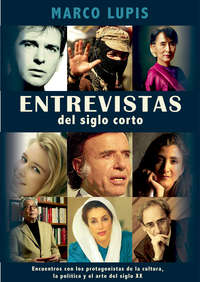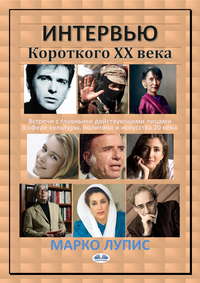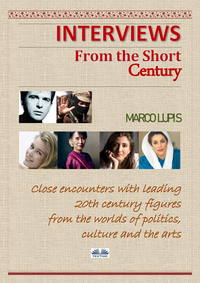
Полная версия
Interviews From The Short Century
Apart from the tragic events, would you like to be the new Romy Schneider?
Wow, what a compliment! Being compared to all these beautiful women. Itâs really flattering, but above all I just want to do everything I can to be me.
What did you want to be when you were growing up?
I certainly didn't think I would become a model. I guess I wanted to be a lawyer.
Like your father?
Yeah, I was all set to go and work for his firm. And then all my plans changed. I realised this was too good an opportunity to turn down, so I grabbed it with both hands.
Your story is a bit of a fairytale for the modern ages. There must have been some tough times?
Oh, sure. But Iâm always confident in my own ability.
Whatâs your secret?
Plenty of discipline. And also being able to be around others. Iâm a people person. I like being able to think on my feet when Iâm facing a barrage of questions from reporters at a press conference. I see it as a challenge; it doesn't scare me.
Is it just about discipline?
You also need to stay level-headed. And thatâs where the way I was brought up comes in. My family have helped me a lot. They made me who I am: confident, pragmatic and well-balanced. I can stay in control even when Iâm out of my comfort zone. For example, itâs thanks to my parents that Iâm now able to speak in public without feeling shy.
If the media is anything to go by, you move pretty quickly from one relationship to another: one day itâs Prince Albert of Monaco, the next Julio Bocca. Who is the real Claudia?
The real Claudia is a girl who has lots of friends. Prince Albert is one of those, Julio Bocca is another. But thereâs also Plácido Domingo, Peter Gabriel and a load of other famous people. As soon as Iâm photographed with them, I have the entire worldâs press immediately claiming they're my boyfriend! Itâs not like that.
But do you eventually see yourself settling down, getting married, having kids?
Iâm absolutely ready to fall in love, the sooner the better. But I don't have a partner right now simply because Iâve not fallen in love with anyone.
What do you look for in a man?
I don't have an ideal type in terms of looks. The first thing I look for is personality, and sense of humour above everything. I need a man to charm me, to win me over with intelligence, with his mind. Someone who can teach me the true value of humour. I mean, you have to be able to laugh, don't you?
Sounds like a pretty demanding job being your boyfriend â¦
Anyone who is with a celebrity needs to be a strong character in their own right. I love men who have character but are also sensitive. If you want to be with me, you have to tolerate noise, intrusion, gossip, reporters...
Do you feel guilty at all?
What do you mean?
I mean, it seems like you have it all: beauty, fame, money...
I do feel lucky. I thank God and my parents for giving me the life I have. Thatâs why, when I can, I try to do something useful or helpful.
But it's not all sunshine and roses in the fashion world, is it? Thereâs drugs, alcohol, fierce rivalries...
Iâm not affected by drugs or alcohol. Jealousy, sure, but I donât really understand it. Models come in all shapes, sizes, personalities and mentalities, so I think there's room enough for everyone. And you donât have to be insanely beautiful. There's something beautiful about every woman. You just have to nurture it.
What do you need to make it big?
The main thing is character, because itâs not like there is a shortage of beautiful women in the world. After that, you need education, personality and discipline.
By that, do you also mean discipline when it comes to your diet?
Not really. I donât smoke and I don't drink, but thatâs only because neither thing appeals to me. I donât eat a lot of meat because I don't think itâs good for you, and Iâm careful about fats. But I love chocolate... Oh, and Fanta of course! (laughs ).
How are you with money?
Itâs not the be all and end all, but it will allow me to do what I want in the future. Money gives you freedom.
What does the word sex mean to you?
To me? (seems genuinely taken aback ).
Yes, to you.
Well, something that happens naturally between two people who are in love with each other. That's it.
Do you feel like you're a particularly sexual, or rather sensual, person?
Absolutely.
? yes!
4
Gong Li
Moonstruck
In early 1996, I had just started to work as a Far East correspondent. I and other journalist friends of mine would meet up with John Colmey, who was working for Time in Hong Kong. John put me in touch with the manager of the glamorous Chinese actress Gong Li, and I managed to get an exclusive interview with her for Panorama on the set of the movie she was filming near Shanghai.
*****
We are in Suzhou, a city on the shores of Lake Tai about fifty-five miles west of Shanghai, where Chen Kaige is preparing to shoot one of the final scenes of Temptress Moon , a film that is keenly anticipated following the global success of Farewell My Concubine three years ago. Crew members are scurrying between what must be more than two hundred extras dressed in 1920s clothing and crowded onto the jetty. The women are wearing typical silk cheongsams, some of the men are sat in sedan chairs reading and, in the background, dockers are loading cargo onto a steamer. They are filming a big farewell scene: Gong Li plays Ruyi, a beautiful and pampered heiress of an extremely wealthy Shanghai family beset by incest, opium abuse and double-crossing. She is about to set sail for Peking with her fiancé Zhongliang, played by Leslie Cheung, the Hong Kong actor whom she also starred alongside in Farewell My Concubine .
Stood on the jetty is Ruyi's childhood friend Duanwu (played by up-and-coming Taiwanese star Kevin Lin), who has secretly been in love Ruyi all along: âYou have to imagine this is the last time you will see her, the very last time! We need to see that in your face; thatâs what I want to see!â urges the forty-six-year-old Chen, who is wearing a leather jacket and black jeans. âRight... Yu-bei ... [Ready...] Action !â As Kevin Lin looks over at the departing ship, his pain is clear to see. â Okay! â yells a satisfied Chen. Thatâs a wrap for the day.
Having spent more than two years writing the script, Chen is working his backside off to get his film ready for the Cannes Festival in May. The son of Chen Huaiâai, himself a giant of post-war cinema, Chen is currently the leading figure in the Chinese film industry and has a reputation for getting the most out of his actors, sometimes stretching their patience to the limit. Just as he has done with the Chinese government, who banned, cut and censored his films for years before eventually acknowledging his status as a maestro of contemporary cinema.
At a cost so far of six million dollars, Temptress Moon to a certain extent represents the current status of the Chinese film industry: no longer totally repressed but not yet fully liberalised, shown across the globe but with its feet firmly planted in China, and simultaneously cosmopolitan yet parochial. And the film set appears to be a microcosm of modern-day China.
The stars of the film are the current cream of the crop from the âthree Chinasâ: Hong Kong (Leslie Cheung), Taiwan (Kevin Lin) and the Peopleâs Republic of China (Gong Li). The Director is an intellectual from Beijing and the producer, Hsu Feng, is a former star of Taiwanese cinema married to a businessman from Hong Kong, where she set up Tomson Films in the eighties. Indeed, it was Hsu who persuaded Chen eight years ago to bring Lilian Lee's novel, Farewell My Concubine , to the big screen.
While there is considerable hype about Chenâs latest directorial outing, what the critics and public are most excited about is the casting of the undisputed star of the film, Gong Li. The thirty-one-year-old actress is currently, without question, the most famous Chinese woman in the world. Her previous films include Red Sorghum (1987), Raise the Red Lantern (1991) and Farewell My Concubine (1993). She has just come out of an eight-year relationship with Zhang Yimou, the director who made her a global star and with whom she made her last film, Shanghai Triad , last year.
Despite Gongâs success in the West, she remains Chinese through and through.
After the dayâs filming had ended, she agreed to meet me for an exclusive interview for Panorama .
Another big film for you and another old story, this time set in 1920s China . Why do you think that is?
I think it's because China has only recently opened its doors to the rest of the world. Ever since, Chinese cinema has enjoyed greater stylistic and cultural freedom. Censorship obviously played a defining role in Chinese cinema and the topics it covered for years, but there's also a more artistic explanation, if you can call it that: many Chinese directors think itâs a good idea to make films about events that pre-date the Cultural Revolution. It's a way of revisiting those events and that era. And maybe they think it's still a bit early for an international audience to see films about recent events, which are still too fresh and painful in people's memories.
Youâre the most famous Chinese woman in the world. Do you feel the responsibility of being an ambassador?
The term ambassador scares me a little, if Iâm honest. Itâs too grand for me! Let's just say I feel that, through my films, I can be a bridge between Chinese and Western culture and history. I think it's fair to say that you guys don't know a great deal about modern China. So it gives me a great sense of pride to think that one of my films can help to educate the West about our people and the way we live our lives.
Sadly, the world's image of China in recent times is mass executions and orphanages with their âdying roomsâ. Is that really what it's like?
China has plenty of problems, there's no getting away from that. Especially if you choose to only look at the negatives and ignore the positives. If you only see one side of a country, you're not seeing the complete picture. China is a massive country with over a billion people, so there are huge differences within it. You canât just make sweeping judgements.
When did you accept the part of Ruyi in Temptress Moon ?
It was luck, really. Or maybe fate. They'd already started filming when a Taiwanese actress quit, so they offered me the part at the last minute. Did you know the Chinese critics are comparing Temptress Moon to Gone with the Wind ?
Are they? Why is that?
Itâs not because of the story; itâs the casting. Chen auditioned dozens of actresses for my role, just like several actresses were cast aside before they chose Vivien Leigh to play Scarlett O'Hara. So theyâd already begun filming when I joined the production. It's not been easy. Iâm playing a spoiled little rich girl, which is nothing like my usual roles.
This is a golden age for Chinese cinema, isn't it? You've got directors like Chen and actors like you, but there's also people like John Woo and Ang Lee making it big in Hollywood .
I think it's because Chinese directors can combine exemplary cinematography with our culture's unique charm and style.
How did you get into acting?
Completely by chance. I loved to sing when I was younger. One day, my singing teacher said I should go with him to watch a TV show being filmed in Shandong. I remember the director was a woman. When she saw me, she decided I had to have a part, so she gave me a copy of the script. It was only a small part, but she decided I was a natural. She said to my mum: âYour daughter must become an actress.â She managed to convince her, and two months later I enrolled at the Central Academy of Drama in Beijing. I studied really hard, started to get small parts and the rest, as they say, is history!
You divide your time between Beijing and Hong Kong. The papers are full of your new relationship with a Hong Kong-based businessman, so do you think you will move there permanently?
I donât think so. I like Hong Kong because itâs bustling and great for shopping. But I find it annoying. Beijing is different. People stop you in the street and talk to you about all sorts. In Hong Kong, itâs all about the money.
Are you fed up with the press sticking their noses into your private life?
I think it comes with the territory really. Itâs mainly the Asian press that often prints unpleasant or made-up stories. The papers in the West have higher standards.
Is it also important for an actress to be beautiful in China?
Do you think Iâm beautiful?
Youâre seen as a sex symbol in the West .
Thatâs really nice, but I don't feel like a sex symbol. Maybe Chinese women have a certain appeal or charm because we are so different to Western women.
What are your plans for the future?
I want to get married and have children. I think family is a really important part of a womanâs life. If you donât have a family, you canât bring experience of everyday life into your work.
And do you have any more films lined up?
Not at the moment. Iâm reading lots of scripts, but none have jumped out at me so far. Iâm not going to accept any old part just for the sake of it.
Would you consider working with a Western director?
If they had a part that was suitable for me as a Chinese woman, sure...why not?
Is there an Italian director youâd like to work with?
Absolutely: Bernardo Bertolucci!
5
Ãngrid Betancourt
The Pasionaria of the Andes
Dina, here is my article with box to follow. I hope you are well.
Today (Monday, February 11), Iâm flying from Tokyo to Buenos Aires, where I will land tomorrow (February 12). You will still be able to reach me on my satellite phone, even while Iâm navigating my away across Antarctica. Iâll be back in Argentina around February 24 and will then head to Bogotá, where I am scheduled to interview Ingrid Betancourt in early March.
Let me know if you'd be interested.
Catch up soon,
Marco
On an old computer, I found this email that I sent in early February 2002 to inform Dina Nascetti, one of my bosses at LâEspresso , of my movements. I had been in Japan to report on the tomb of Jesus [1] and I was preparing to embark on a long journey that would take me far away from home for nearly two months. I was headed for the end of the Earth: Antarctica.
On the way out, I planned to report on the severe economic crisis that was gripping Argentina, and on the way back, I would go via Colombia to interview Ingrid Betancourt Pulecio, the Colombian politician and human rights activist. As it turned out, I arrived in Bogotá a couple of days early, which - for me at any rate - was a stroke of luck. I interviewed Ms Betancourt on February 22, and precisely twenty-four hours later she vanished into thin air while being driven from Florencia to San Vicente del Caguán. She had been kidnapped by FARC (Revolutionary Armed Forces of Colombia) guerrillas and would be held hostage for more than six years.
If Iâd arrived in Colombia just a day later, I never would have met her.
*****
She has shoulder-length brown hair and typically Colombian dark eyes. She wears an amber bracelet on her wrist and rarely cracks a smile.
But then, Ãngrid Betancourt doesnât have many reasons to smile. She may look younger than her forty years and have an enviable petite frame, but she is running for the presidency of Colombia, the most violent country in the world, where ten people are kidnapped and seventy people murdered every single day. Where war has raged for four decades, claiming thirty-seven thousand civilian lives in the last twelve years alone. A country that boasts the dubious honour of being the worldâs leading producer of cocaine. A country from which over a million people have fled in the last three years.
And yet, it is not so long ago that this same woman sat before me today in a heavily guarded, clandestine apartment in downtown Bogotá, wearing a bulletproof vest and a nervous expression, was smiling serenely as she lay on a beach in the Seychelles, where her handsome and sophisticated French diplomat husband had been posted.
Precisely twenty-four hours after the interview, while being driven from Florencia to San Vicente del Caguán, on the front line of the battle between FARC rebels and government forces, Ãngrid Betancourt disappears along with a French photographer and cameraman accompanying her to document an electoral campaign fraught with danger. Everything points to a kidnapping.
A dramatic event which paradoxically, even for a country as pitiless as Colombia, âsuddenly increases the likelihood of her winning the electionâ, Gabriel Marcela, professor at national war college ESDEGUE, knowingly observes.
It was Ms Betancourt's own decision to come back to this hellish place in 1990, aged just thirty and in the prime of her life.
A former member of the Chamber of Representatives she has founded the Oxygen Green Party âin order to bring clean air into the corrupt world of Colombian politicsâ, she explains solemnly. The partyâs slogan reads: â Ãngrid es oxigeno â [Ãngrid is oxygen]. And the campaign poster shows the woman herself with an anti-smog mask and surrounded by coloured balloons. The one hundred and sixty thousand votes she received when she was elected Senator four years ago were the most for any candidate in a Senate election in Colombia. But it could be argued that she wouldn't still be in the headlines without her recently published autobiography, the Italian title of which leaves us in no doubt as to her current frame of mind: Theyâll Probably Kill Me Tomorrow .
I put it to her that this might be a shade melodramatic.
â The French edition was titled La rage au coeur [With Rage in My Heart],â she responds defensively. âBut the Italian publishers wanted a stronger title, so that's what we went for. And actually, thatâs really how Iâm feeling. It's what goes through my head first thing in the morning and last thing at night. I donât think itâs particularly melodramatic. The prospect of being murdered tomorrow is a very real one for millions of this people in this country.â
The French newspapers are portraying her as some kind of latter-day saint: Paris Match called her âThe woman in the firing lineâ, Libération âA heroineâ, Le Figaro âThe Pasionaria of the Andesâ. Le Nouvel Observateur wrote: âif Simon BolÃvar, the liberator of Latin America, could have chosen an heir, he would have chosen herâ.
Whereas the Colombian press have had a laugh at her expense. Semana , the countryâs leading weekly news magazine, lampooned her on the cover as Joan of Arc, complete with horse, armour and lance. The truth is, her book is far more measured and dry than its title and reviews would suggest. Ms Betancourt makes no attempt to hide her privileged background. As a young girl, she would ride horses every week at a farm owned by friends.
But she is full of ideas and has no difficulty putting them into words. âConservative estimates suggest that in 1998, Colombia's biggest guerrilla group, FARC, received annual funding of about three hundred million dollars, most of which came from drug trafficking, kidnapping and extortion. Today, that figure is close to half a billion dollars, and its membership has increased from fifteen thousand to twenty-one thousand. This situation,â she continues, âis putting the Colombian government at a huge disadvantage in their fight against the rebels. In order to secure a decisive victory, we believe that the government would have to deploy three or four highly trained soldiers for each FARC guerrilla, whereas the most they can currently send out is two. And all this requires an economic outlay that my country simply canât afford. Since 1990, the cost of suppressing the rebels has increased nearly ten fold. At the beginning, it was costing one per cent of GDP but now it is more than two per cent - one billion US dollars...it's astronomical.â
So is she a hot-headed fanatic, like her enemies claim, or simply a woman who wants to do something for her country, which is how she sees it? The political elite in Bogotá are trying to ignore her candidature, but they are gradually starting to fear her. Omar, her chief bodyguard, pipes up: âIn this country, you can pay for honesty with your life.â Ms Betancourt interjects quickly: âIâm not afraid of dying. Fear keeps me on my toes.â








